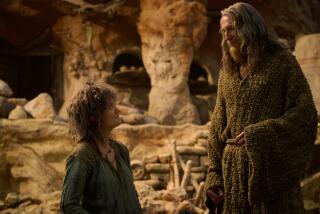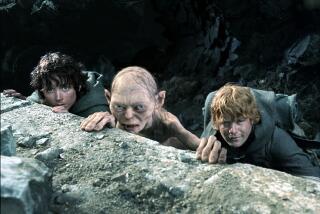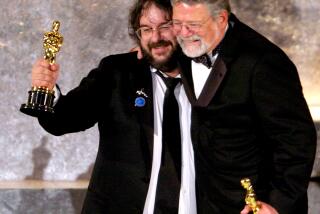‘Rings’ Stirs Something In Us All
- Share via
Earning nearly $300 million at the box office thus far and nominated for Oscar gold, “The Lord of the Rings” seems charmed from the start. When you add that the books were voted the best of the 20th century in several recent polls and have sold 50 million copies worldwide, you know there is something more profound at work here.
According to the writer Sean McGrath, “Rings” holds a magic mirror to our world and “penetrates below the skin to expose the archetypes within ... laying bare the nature and scale of the universal quest in which we are every one of us engaged: what we stand to lose and what we stand to gain.”
Far more than a fairy tale, J.R.R. Tolkien’s epic parallel world of good and evil is one in which we can participate vicariously. Through rich and evocative language (the kind you would expect from a world-renowned Oxford philologist) and daring heroics, the author explores the themes of choice, free will and sacrifice, while exposing the many faces of power. And by using the most unlikely hero, an innocent and untried 3-foot-tall Hobbit who has hardly stepped out of the confines of his home--and setting him up against the most unimaginable evil--he awakens the believer in us all.
In Tolkien’s World, Everything Matters
That’s part of Tolkien’s magic. He understands the underdog, injustice and the impossible dream, and in response has created a David-vs.-Goliath world in which everything matters--where choices, virtue and heroics, however large or small, are incredibly significant. In Middle-earth the stakes are high but also clear, which is a far cry from our own time, when morality often is drowned in the murky waters of public opinion, and good gives way too easily to mediocrity.
Like his friend and fellow writer C.S. Lewis, Tolkien found truth (as with his Christian faith) to be eternal, unchanging and nonnegotiable. Joseph Pearce, author of “Tolkien, Man and Myth,” told me in a recent radio interview: “Tolkien believed that good and evil are objectively real ... that they exist. This in and of itself in our relativistic age is provocative. It’s not a question of your evil being my good, and your good being my evil.”
Satan was quite real to Tolkien, as was a God from whom the truth emanated. He believed in his dualistic fictional world, as in our real one, that there was a divine plan, and that there was “a final bliss to be enjoyed.”
In fact, Pearce attributes “Rings” phenomenal success and enduring appeal in part to this point. He said, “He’s tapping into the needs of so many readers. They’ve been told by certain sectors of the intelligentsia that there is no good and evil, but they know better.”
Salvation Theme Is Central to ‘Rings’
Not surprisingly, salvation is central to the metaphorical masterpiece. We see the four main heroes make unbelievable sacrifices as each undergoes a Christlike kind of death, rebirth and descent into the underworld in the quest for the ultimate redemption. In the face of such awesome feats, readers and moviegoers are humbled, inspired and even transformed.
Perhaps this is why we love “Rings” so much. It awakens something deep, virtuous and transcendent within. Pearce said, “You will lose yourself in [Tolkien’s] wonderful world ... wonderful in the literal sense ... as in wonder-filled. But at the same time you lose yourself in that world, paradoxically you find yourself in this one.”
More to Read
Sign up for our Book Club newsletter
Get the latest news, events and more from the Los Angeles Times Book Club, and help us get L.A. reading and talking.
You may occasionally receive promotional content from the Los Angeles Times.










